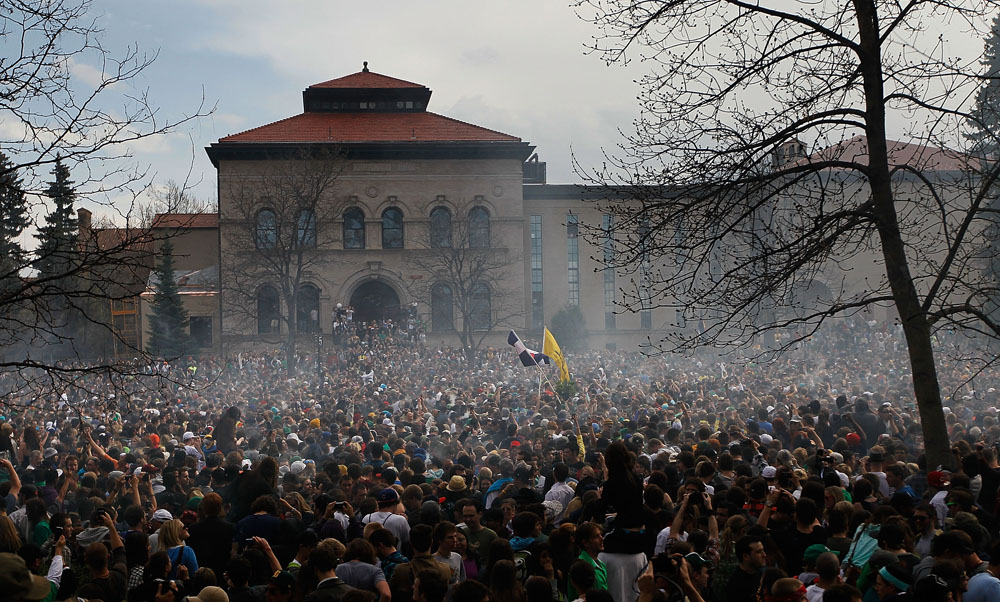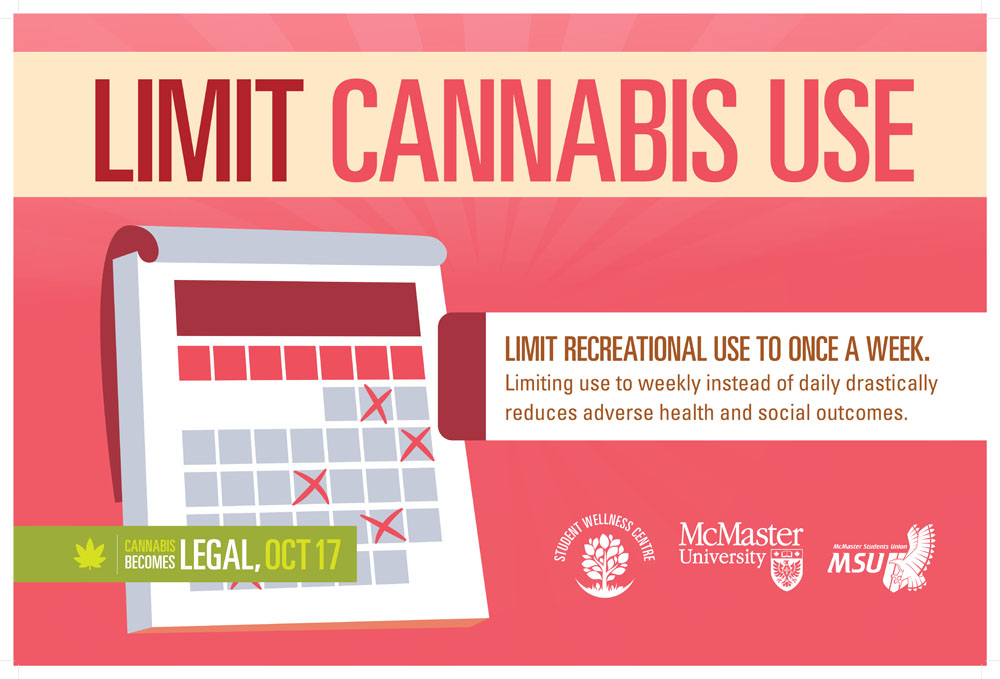In the first week of September, thousands of university students will arrive at campuses large and small across Canada.

And in the third week of October, something newer will appear — completely legal recreational marijuana.
Cannabis isn’t a novelty on Canadian campuses, of course, but with legality comes the need for rules that are more complicated than when it was simply illegal. Universities could ban pot, on paper, and treat it with varying levels of tolerance in practice.
In play: an unrelated trend toward completely banning smoking (tobacco, cannabis, anything) on university campuses, bans on public consumption of pot in most provinces, and the fact that many students may be underage.
In general, universities seem to be including cannabis in smoking restrictions already in place for tobacco, following provincial law on public consumption (some allow it, others won’t), banning students from growing pot in residence and wrestling in different ways with the complicated question of edibles.

McGill University is headed toward having the most restrictive cannabis policy we could find anywhere in the country.
McGill’s interim policy would ban not only smoking marijuana, but consuming edibles as well, along with their “serving, cooking, preparing (and) production”. (Possession will be allowed.)
McGill would not make a person available for an interview to discuss the draft rules. They will be finalized in the fall after more consultation, spokesperson Chris Chipello wrote in an email.
“It seems to me that it’s completely unenforceable,” says Jenna Valleriani, a postdoctoral fellow at the University of British Columbia. “I have no idea how they would do it.”
“Cannabis oils … are so discreet. There’s nothing that differentiates that from dropping turmeric oil into your drink or something like that.”
Chipello would not answer questions about the enforceability of a ban on edible or drinkable pot.
“Our interim guidelines take a conservative approach for now, and our consultations leading up to the end of October will allow us to further refine things,” he wrote in an email.
(Quebec’s minimum age for cannabis will be 18, so the issue of students being underage won’t arise as much as it would in other provinces.)
McGill’s policy makes no allowance for medical use.
“While the interim guidelines don’t include an explicit medical-use exception, we will also follow the Quebec legislation on that,” Chipello wrote.

On Oct. 17, a Cannabis NB store will open a few blocks from Mount Allison University in Sackville, N.B.
Before students get out their wallets, though, they should have a good look at what the university will actually allow them to do under its brand-new cannabis policy.
To start with, they won’t be able to light up a joint anywhere on campus, residence rooms included. (They couldn’t light a cigarette, either.)

Get breaking National news
Can they step off the university’s property and light up? In public, they’d run afoul of New Brunswick’s ban on public consumption. What about off-campus housing? Well, that’s up to their landlord.
They won’t be able to grow their own plants.
They also won’t be able to cook with marijuana on campus.
“Baking and cooking with cannabis is not permitted in residence primarily because of the odour and potential problems this could cause for individuals with environmental sensitivities,” spokesperson Laura Dillman wrote in an email.
They will, however, be allowed to store dried cannabis (in a clearly labelled airtight container, as New Brunswick law requires), though storing marijuana, as an activity, would seem to have limited appeal.
This really only leaves one option: the THC-infused oils will be sold on Day 1, along with more traditional dried flowers. (If they can make their way down the road to Amherst, N.S., they’ll be able to pick up cannabis gel caps at the liquor store.)
(Ready-made edibles, like THC-infused chocolate, won’t be available until the fall of 2019.)

McMaster University plans a education campaign about cannabis for students in September. (HANDOUT)
McMaster University in Hamilton, Ont., has a complete campus-wide smoking ban, which will also apply to cannabis.
McMaster plans to only allow edibles if they are labelled from the manufacturer, said spokesperson Andrea Farquhar. That means that students could consume THC-infused oil directly, but not add it to a drink that might be shared by accident, or end up in a residence kitchen refrigerator.
“One of the concerns is that if there’s anything that’s not labelled,” she said. “As soon as you start mixing it, you aren’t going to have a label on it.”
She acknowledged that this might be challenging to enforce.
“It’s like any type of enforcement — you’re never going to capture 100 per cent of everything that may or may not happen. But certainly it’s clear what the expectations are.”

The University of Toronto has looser smoking rules than McMaster, but given Ontario’s ban on public consumption and university bans on smoking in residence, there is no space to smoke marijuana on campus.
“Between the (provincial) Cannabis Act and the residence contracts that our students sign, our students will not generally be smoking cannabis at U of T,” said university official Heather Kelly.
The university plans to handle edible and drinkable cannabis as it does alcohol: students are free to consume in private residence rooms, so long as it’s legal.
“If they follow the law and the residence contract, they’re of age, it’s a legal amount, and it’s not being consumed in common areas or public spaces, that is a decision for individual students to make.”
“We don’t currently permit students to have open possession of alcohol in common areas of residence. The same will be for cannabis.”

Memorial University of Newfoundland spokesperson David Sorenson pointed to its campus-wide smoking ban, which he said applied to both tobacco and cannabis.
“Edibles have not been legalized under the current legislation and violations would continue to be addressed through law enforcement as they have been in the past,” he wrote in an email.
However, cannabis oils and capsules will be available in Newfoundland and Labrador in October. Sorenson said a policy about this would be announced closer to Oct. 17.
Every university we talked to planned to ban growing marijuana in residence.









Comments
Want to discuss? Please read our Commenting Policy first.